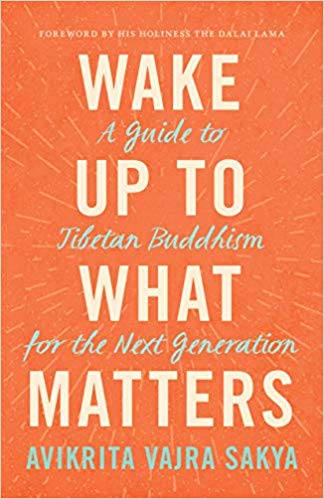
Book Review — Wake Up To What Matters: A Guide to Tibetan Buddhism for the Next Generation by Avikrita Vajra Sakya
- By Charlotte Odenson --
- 06 Mar 2020 --
 A 25-year-old with thousands of students around the world, Avikrita Vajra Sakya is one of the highest-ranked lamas in Tibetan Buddhism. Born in the U.S. as part of a family that traces its roots to the beginnings of Tibetan Buddhism, Avikrita has created a unique presentation to millennials of the spiritual journey to be found in his religion.
A 25-year-old with thousands of students around the world, Avikrita Vajra Sakya is one of the highest-ranked lamas in Tibetan Buddhism. Born in the U.S. as part of a family that traces its roots to the beginnings of Tibetan Buddhism, Avikrita has created a unique presentation to millennials of the spiritual journey to be found in his religion.
With this book, Wake Up To What Matters: A Guide to Tibetan Buddhism for the Next Generation Avikrita brings Buddhism into the 21st century with references to cell-phones, global warming, gender identity and “dudes,” to create a bridge of understanding between today’s frenzied lifestyle and the benefits offered by the Dharma, the teachings of Buddha.
He explains that Buddha is not considered or worshiped as a God. The Dharma, he says, is two-fold. There is the verbalized Dharma — the teachings of the Buddha — and the discovery of the nature of reality that leads to a deep understanding of the truth. Finding that truth, according to Avikrita, is a matter of practice and he describes the steps in his book.
The practice is important, because as Avikrita explains, “When we talk about faith in Buddhism, it’s really important to emphasize that this does not mean blind faith — a belief in dogma that we subscribe to, whether it leads to virtue or not, because some higher power is supposed to have said so. Rich faith in Buddhism is a reliable faith — faith that, due to causes that we have looked at ourselves, is a trust and even a passion for something authentic that makes virtue arise in our minds.”
He does criticize modern scholars who have tried to adopt the concept of “mindfulness” but who “disparage belief in rebirth and want to create a totally secular and materialistic or psychotherapeutic approach to Buddhism — but how is that even Buddhism?”
His discussions on charity and morality are based on the understanding that “the true nature of the mind is pure” and shows that through learning and wisdom one is “taking responsibility for our own karma.”
The book then becomes a beginner’s guide to the practice of Buddhism, stressing that “the seed of awakening is in you.” The steps taken are all outlined and the explanations are clear and easily understood with very real references to everyday life. Because the book is partially an aggregation of talks Avikrita has given, there are discussions on fear, anger, pride, doubt, fixed views, and also peace and happiness.
Tibetan Buddhism is perhaps best known for its present-day leader, the Dalai Lama, and Avikrita refers to him often. For a 25-year-old young man, Avikrita’s understanding of how to communicate this centuries-old version of the 2,500-year-old religion is impressive.
This is a worthwhile book for anyone wanting to gain a better understanding of true Tibetan Buddhism. And for someone who desires to begin this path, this is an easily understood way to start.
Author: Avikrita Vajra Sakya was born in the U.S. and is now living in the Dzongsar Institute in India, studying Buddhist philosophy and teaching monks and nuns throughout the Himalayas.


















